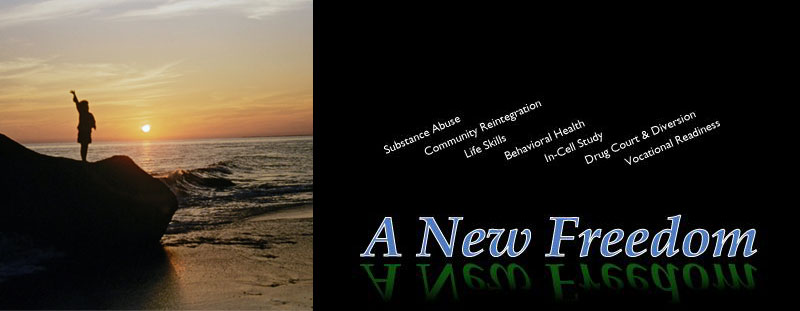
Substance Abuse & Mental Health Resources for Correctional Programs
| Click here for pricing information |
![Link to Resources Catalog in PDF Format [Link to Resources Catalog]](img/thumbnf-cat-off.png)
![Link to Logic Model in PDF Format [Link to Logic Model]](img/thumbnf-lm-off.png)
![Link to Additional Informaton About Logic Model in PDF Format [Link to Additional Information About Logic Model]](img/thumbnf-lma-off.png)
A New Freedom offers comprehensive, flexible, and cost-effective substance abuse curriculums, behavioral health treatment resources, conflict reduction programs, and risk reduction services for adult, juvenile, and emerging adult correctional and community programs.
We provide mental health, substance abuse, dual diagnosis, risk reduction, conflict management, relapse prevention, and community reintegration resources to over 2,500 correctional facilities and community programs nationwide. These innovative, state-of-the-art materials provide quality programming at a very reasonable cost. You get the rights to make unlimited copies for use on each licensed site, with a site license that never expires.
-
Core Programs — These Core Program resources specifically designed for corrections and jails can serve as a basis for a system-wide program addressing internal and external triggers, feelings of anger, and issues of aggression or violence
-
In-Cell/Self-Study Programs — extensive workbook-based cognitive change and criminal thinking resources for administrative segregation or self-study. Different models provided to hundreds of facilities nationwide. Additional resources support the transition or step-down from ad seg to general population.
-
Intensive Outpatient Programs (IOPs) and Extended Outpatient Programs (EOPs) — Resources support Substance Abuse, Behavioral Health, Dual Diagnosis, and Anger Management programs up to 1 year in length
- Substance Abuse Treatment — comprehensive substance abuse treatment program materials based on cognitive-behavioral (CBT) and motivational interviewing (MI) models: adult/juvenile, open/closed group, 1:1, short-stay, drug court, community, residential, stages-of-change-based, male/female, and Spanish language.
- Resources For Correctional Facilities — resources address anger management, aggression,violence, and Gangs issues for correctional programs.
-
Mental Health/Behavioral Health and Dual Diagnosis — comprehensive treatment planning and support resources complete with counselor's tools, client and counselor worksheets, MI elements, and workbooks. Open group/Open admissions 10-session Topical Mental Heath resources include Anxiety, Depression, Trauma, Grief/Loss, Sleep Disturbances, and other difficult feelings, and new elements for seriously mentally ill populations, including psychotic spectrum and mood disorders.
-
Programs for Veterans, Seniors, and Emerging Adults —Programs developed for special populations.
-
Probation/Parole/Community Programs/Community Services — adult and juvenile resources support community programming as alternatives to incarceration, or post-release supervision and aftercare.
-
Female Gender Specific Resources — core programs, trauma-informed issue-specific overlays, substance abuse, behavioral health, and women's pathways to offending and desistence.
-
Resources For Youth In Residential Settings — comprehensive resource options support community programs., probation, gang prevention/intervention, alternative schools, detention center, and long-term residential correctional settings.
-
Resources For Community Programs And Juvenile Probation — resources for community programs for at-risk youth, young people on probation,alternative schools, and gang prevention/interventionprograms.
-
Spanish Language Resources — Spanish language substance abuse treatment and other program resources. Una Libertad Nueva includes comprehensive programs for adults and juveniles, including over 60 workbooks (available in both English and Spanish versions). Also appropriate for ad seg populations.
-
Life Skills Resources for Mental Health, Transitional Populations, and ADL — Resources for improving life skills. Pathways to Daily Living and Interpersonal Communications Skills options include more than 100 one-hour lessons, with detailed lesson plans, client worksheets, and skill-building activities. Supplemented by Problem Solving program resources and our Vocational Readiness/Employment Preparation program.
-
Resources for Jails — a full range of programming to fit the specific needs of jails, from Substance Abuse to Mental Health to special programming for Administrative Segregation to Transition. Everything is delivered in a carefully structured approach that helps ensure successful treatment that you can document.
-
Design a Custom Curriculum — let us help you design a curriculum or contact us about a phone consultation.
Our resources address critical personal, environmental, and community risk factors, and build on key protective factors and assets. All our resources are solidly based on evidence-based strategies that are absolutely top tier, and have been proven effective in countless studies featuring rigorous experimental designs:
- Cognitive Behavioral Therapy (CBT)
- Dialectical Behavioral Therapy (DBT)
- Skill-Building for conflict resolution and violence prevention
- Social Learning Model: behavior rehearsal, role-playing
- Stages of change model (Prochaska, DiClemente, Freeman, Nolan)
- Motivational Interviewing (MI)
We invite you to review the program overviews and sample materials on this site. We can provide you with price quotes, custom program models, and any assistance you need in choosing the right materials for your programs.
A New Freedom • © 1995-2025 A. R. Phoenix Resources, Inc. • All Rights Reserved • Any questions? Contact us!